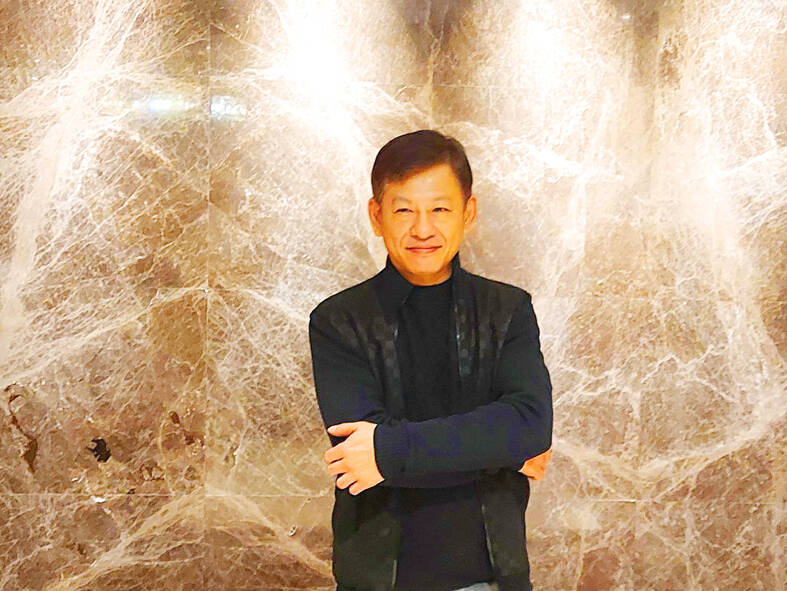Lawmakers should attach clauses that would permit loss-making transfers among joint buyers for loan arrangement reasons to an amendment to the Equalization of Land Rights Act (平均地權條例) that aims to clamp down on speculative buying in the property market, Shin Ruenn Construction Co (新潤機構) chairman Ben Huang (黃文辰) said yesterday.
Huang, who is also vice chairman of the New Taipei City Real Estate Development Association, told a news conference that it is odd that the amendment would subject property purchases by legal entities to prior approval, as it would contravene free market principles.
The bans could dampen buying interest and stretch transaction periods, but are unlikely to trigger substantial price corrections given spikes in land, building materials and labor costs, Huang said.

Photo: Chen Yung-chi, Taipei Times
“Shin Ruenn would stand by its construction schedule despite economic uncertainty and unfavorable legislation,” he said.
Developers and builders would defend the 20 percent profit margin if 25 percent gains turn out to be unfeasible, Huang said.
Developers would price their projects more reasonably, rather than engage in price concessions to facilitate deals, he said.
A flat market is also favorable for developers that seek to build land stock, he said, adding that land prices have been unreasonably high in recent years.
The company said its affiliated Shin Ruenn Development Co (新潤興業) is to post NT$35.5 billion (US$1.16 billion) in profit over the next four years in line with a sustainable business strategy, and it expects the ongoing economic slowdown to make property prices more reasonable next year.
The Taipei-based developer is due to recognize profit from joint ventures at two pre-sale projects, Good Life of Metro Heart I and II in Taoyuan’s Luzhu District (蘆竹), Shin Ruenn Development chairman Kuo Chang-geng (郭長庚) said.
The projects near the Taoyuan International Airport MRT Line have sold out, and Shin Ruenn Development could divide a profit of NT$1.23 billion upon their completion next year, Kuo said.
The company has sold 99 percent of the Shin Ruenn double complex in New Taipei City’s Linkou District (林口) and posted a 94 percent sales rate for the Manor House in Taoyuan’s Dayuan District (大園), he said.
The developer has participated in the development of Fancy World in New Taipei City’s Tamsui District (淡水) and Sky Forest in Taipei’s Nangang District (南港).
Those projects have sales rates of more than 80 percent, which meant the company has divided NT$930 million and NT$5.22 billion for each, Kuo said.
Sales rates of more than 50 percent give developers and builders confidence to continue with construction without worrying over cash flow, profitability and other issues, Huang said.

Intel Corp chief executive officer Lip-Bu Tan (陳立武) is expected to meet with Taiwanese suppliers next month in conjunction with the opening of the Computex Taipei trade show, supply chain sources said on Monday. The visit, the first for Tan to Taiwan since assuming his new post last month, would be aimed at enhancing Intel’s ties with suppliers in Taiwan as he attempts to help turn around the struggling US chipmaker, the sources said. Tan is to hold a banquet to celebrate Intel’s 40-year presence in Taiwan before Computex opens on May 20 and invite dozens of Taiwanese suppliers to exchange views

Application-specific integrated circuit designer Faraday Technology Corp (智原) yesterday said that although revenue this quarter would decline 30 percent from last quarter, it retained its full-year forecast of revenue growth of 100 percent. The company attributed the quarterly drop to a slowdown in customers’ production of chips using Faraday’s advanced packaging technology. The company is still confident about its revenue growth this year, given its strong “design-win” — or the projects it won to help customers design their chips, Faraday president Steve Wang (王國雍) told an online earnings conference. “The design-win this year is better than we expected. We believe we will win

Chizuko Kimura has become the first female sushi chef in the world to win a Michelin star, fulfilling a promise she made to her dying husband to continue his legacy. The 54-year-old Japanese chef regained the Michelin star her late husband, Shunei Kimura, won three years ago for their Sushi Shunei restaurant in Paris. For Shunei Kimura, the star was a dream come true. However, the joy was short-lived. He died from cancer just three months later in June 2022. He was 65. The following year, the restaurant in the heart of Montmartre lost its star rating. Chizuko Kimura insisted that the new star is still down

While China’s leaders use their economic and political might to fight US President Donald Trump’s trade war “to the end,” its army of social media soldiers are embarking on a more humorous campaign online. Trump’s tariff blitz has seen Washington and Beijing impose eye-watering duties on imports from the other, fanning a standoff between the economic superpowers that has sparked global recession fears and sent markets into a tailspin. Trump says his policy is a response to years of being “ripped off” by other countries and aims to bring manufacturing to the US, forcing companies to employ US workers. However, China’s online warriors